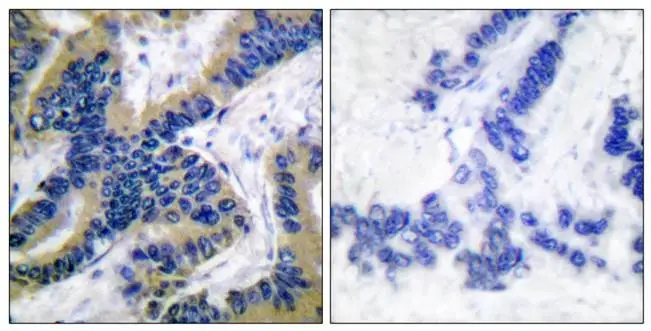![ICC/IF analysis of NIH3T3 cells using GTX01098 Caspase 6 antibody [GT1155]. Orange: Primary antibody Blue: DAPI ICC/IF analysis of NIH3T3 cells using GTX01098 Caspase 6 antibody [GT1155]. Orange: Primary antibody Blue: DAPI](https://www.genetex.com/upload/website/prouct_img/normal/GTX01098/GTX01098_20191101_AP_002_64_w_23053121_112.webp)
ICC/IF analysis of NIH3T3 cells using GTX01098 Caspase 6 antibody [GT1155]. Orange: Primary antibody Blue: DAPI
Caspase 6 antibody [GT1155]
GTX01098
ApplicationsImmunoFluorescence, Western Blot, ImmunoCytoChemistry
Product group Antibodies
ReactivityHuman, Mouse
TargetCASP6
Overview
- SupplierGeneTex
- Product NameCaspase 6 antibody [GT1155]
- Delivery Days Customer9
- Application Supplier NoteWB: 1:500 - 1:2000. ICC/IF: 1:50 - 1:200. *Optimal dilutions/concentrations should be determined by the researcher.Not tested in other applications.
- ApplicationsImmunoFluorescence, Western Blot, ImmunoCytoChemistry
- CertificationResearch Use Only
- ClonalityMonoclonal
- Clone IDGT1155
- ConjugateUnconjugated
- Gene ID839
- Target nameCASP6
- Target descriptioncaspase 6
- Target synonymsCSP-6, MCH2, caspase-6, caspase-6, apoptotic protease MCH-2, caspase 6, apoptosis-related cysteine peptidase, caspase 6, apoptosis-related cysteine protease, mammalian Ced-3 homologue 2
- HostRabbit
- IsotypeIgG
- Protein IDP55212
- Protein NameCaspase-6
- Scientific DescriptionThis gene encodes a member of the cysteine-aspartic acid protease (caspase) family of enzymes. Sequential activation of caspases plays a central role in the execution-phase of cell apoptosis. Caspases exist as inactive proenzymes which undergo proteolytic processing at conserved aspartic acid residues to produce two subunits, large and small, that dimerize to form the active enzyme. This protein is processed by caspases 7, 8 and 10, and is thought to function as a downstream enzyme in the caspase activation cascade. Alternative splicing of this gene results in multiple transcript variants that encode different isoforms. [provided by RefSeq, Oct 2015]
- ReactivityHuman, Mouse
- Storage Instruction-20°C or -80°C,2°C to 8°C
- UNSPSC12352203
References
- Lin YC, Wang JC, Wu MS, et al. Nifedipine Exacerbates Lipogenesis in the Kidney via KIM-1, CD36, and SREBP Upregulation: Implications from an Animal Model for Human Study. Int J Mol Sci. 2020,21(12). doi: 10.3390/ijms21124359Read this paper
- Lin YC, Wu MS, Lin YF, et al. Nifedipine Modulates Renal Lipogenesis via the AMPK-SREBP Transcriptional Pathway. Int J Mol Sci. 2019,20(7). doi: 10.3390/ijms20071570Read this paper

![WB analysis of various samples using GTX01098 Caspase 6 antibody [GT1155]. Dilution : 1:1000 Loading : 25 microg WB analysis of various samples using GTX01098 Caspase 6 antibody [GT1155]. Dilution : 1:1000 Loading : 25 microg](https://www.genetex.com/upload/website/prouct_img/normal/GTX01098/GTX01098_20200508_WB_w_23053121_710.webp)
![Untreated (-) and treated (+) Jurkat whole cell extracts (30 microg) were separated by 15% SDS-PAGE, and the membrane was blotted with Caspase 6 antibody [GT1155] (GTX01098) diluted at 1:500. The HRP-conjugated anti-rabbit IgG antibody (GTX213110-01) was used to detect the primary antibody. Untreated (-) and treated (+) Jurkat whole cell extracts (30 microg) were separated by 15% SDS-PAGE, and the membrane was blotted with Caspase 6 antibody [GT1155] (GTX01098) diluted at 1:500. The HRP-conjugated anti-rabbit IgG antibody (GTX213110-01) was used to detect the primary antibody.](https://www.genetex.com/upload/website/prouct_img/normal/GTX01098/GTX01098_4000000038_20200417_WB_treatment_Etoposide_w_23053121_321.webp)




![ICC/IF analysis of C6 cells using GTX01097 Caspase 6 antibody [GT1154]. Orange: Primary antibody Blue: DAPI](https://www.genetex.com/upload/website/prouct_img/normal/GTX01097/GTX01097_20191101_AP_002_62_w_23053121_265.webp)

![IP analysis of Jurkat cell lysate using GTX17822 Caspase 6 antibody [3F52].](https://www.genetex.com/upload/website/prouct_img/normal/GTX17822/GTX17822_20191203_IP_31_w_23060620_418.webp)
